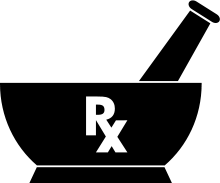This is an introductory post on
Pharmacy and this blog will cover everything about pharmacy and will get more
informative with the coming updates. Pharmacy is the science or practice of the
preparation and dispensing of medicinal drugs. It is a health profession that
links health sciences with chemical sciences and aims to ensure the safe and
effective use of pharmaceutical drugs.
The scope of pharmacy practice
includes more traditional roles such as compounding and dispensing medications,
and it also includes more modern services related to health care, including
clinical services, reviewing medications for safety and efficacy, and providing
drug information. Pharmacists, therefore, are the experts on drug therapy and
are the primary health professionals who optimize use of medication for the
benefit of the patients. However, the original Greek roots from pharmakos imply "sorcery or even
poison".
The earliest known compilation of
medicinal substances was the Sushruta
Samhita, an Indian Ayurvedic treatise attributed to Sushruta in the 6th century BC. However, the
earliest text as preserved dates to the 3rd or 4th century AD. Many Sumerian
(late 6th millennium BC - early 2nd millennium BC) cuneiform clay tablets
record prescriptions for medicine. Ancient Egyptian pharmacological knowledge
was recorded in various papyri such as the Ebers
Papyrus of 1550 BC.
There are mainly two symbols used by
pharmacy organizations worldwide. One of them is the mortar and pestle and the ℞ (recipere) character, which
is often written as "Rx" in typed text. Rx stands for “treatment /
take as prescribed / take thou”


Pharmacy organizations often use other symbols, such as the
"Bowl of Hygieia" which consists of a bowl with a snake around it.
Snake denotes poison which relates to drug or medicine as in some ancient and
modern treatment uses snake venom and bowl denotes hygiene.
According to PCI - Indian Pharma
industry which has registered a spectacular progress today ranks 4th in volume
and 13th in value in the global pharmaceutical market with exports worth US
Dollars 2.6 billion besides domestic sales amounting to over US Dollars 4
million.
The ever expanding Pharma's industrial and practice sectors need clinically and technologically trained pharmacy professionals who can face global challenges and compete with the multinationals. The pharmacist is no longer a mere dispenser of drugs but has assumed a more crucial role in medicine management and as overall health care programmer.
Pharmacists are healthcare professionals with specialised education
and training who perform various roles to ensure optimal health outcomes for
their patients through the quality use of medicines. Pharmacists may also be
small-business proprietors, owning the pharmacy in which they practice. Since
pharmacists know about the mode of action of a particular drug, and its
metabolism and physiological effects on the human body in great detail, they
play an important role in optimization of a drug treatment for an individual.
Pharmacy Technicians support the work of pharmacists and other
health professionals by performing a variety of pharmacy related functions,
including dispensing prescription drugs and other medical devices to patients
and instructing on their use. They may also perform administrative duties in
pharmaceutical practice, such as reviewing prescription requests with medics's
offices and insurance companies to ensure correct medications are provided and
payment is received.
In coming future pharmacists are expected to become more integral
within the health care system. Rather than simply dispensing medication,
pharmacists are increasingly expected to be compensated for their patient care
skills.

No comments:
Post a Comment